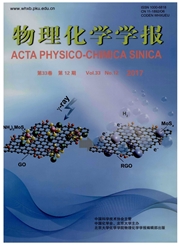

 中文摘要:
中文摘要:
氢气作为一种高热值的清洁能源广泛地应用于工业中.研究证明:生物质通过化学过程可以转化为多种气体燃料(氢气),液体燃料以及高附加值的化学品.生物质作为一种环境友好型再生洁净能源,其研究越来越受到关注.本文旨在探讨利用生物油为原料,通过水蒸汽重整方法制备富氢合成气的过程.利用均匀浸渍的方法制备了一种高分散的碳纳米纤维促进的镍(Ni/CNFs)催化剂,并将普通的Al2O3作为载体的Ni/Al2O3催化剂和Ni/CNFs作对比.研究了重整温度以及水蒸汽和碳摩尔比(nS/nC)对生物油水蒸汽重整制氢的影响.结果表明:碳纳米纤维作为载体用于生物油水蒸汽重整制氢的效果要远优于普通的Al2O3载体,利用22%Ni/CNFs催化剂时,在实验温度范围内(350-550°C),最高生物油转化率和氢气产率分别达到了94.7%和92.1%,通过研究重整条件以及对催化剂进行表征探讨了生物油在水蒸汽重整过程中催化剂的构效关系.
 英文摘要:
英文摘要:
Hydrogen is a clean energy with high heat value that has been widely used in industry. Previous studies indicate that biomass can be converted in to gaseous fuels (hydrogen), liquid fuels and other chemicals. Biomass is the only renewable carbon resource and has attracted increasing attention because of the increasing price of oil and its environmental friendliness. To decrease energy consumption and minimize cost, it is very important to develop a process to produce hydrogen from bio-oil by low temperature steam reforming over non-noble metal catalysts. This work reports a carbon nanofibers- supported Ni (Ni/CNFs) catalyst prepared by the homogeneous impregnation method. The Ni/CNFs catalyst was successfully used to produce hydrogen via low-temperature (350-550 ℃) steam reforming of bio-oil. The effects of temperature and water steam/carbon molar ratio (ns/nc) on the reforming of bio-oil were investigated. The highest carbon conversion and H2 yield over the 22% Ni/CNFs catalyst reached about 94.7% and 92.1%, respectively, at a reforming temperature of 550 ℃. The Ni/CNFs catalyst containing a uniform Ni distribution exhibited a much higher activity in low-temperature reforming of bio-oil at 350-450℃ than the usual Ni/AI203 catalyst. Reaction conditions were investigated and catalysts were characterized to reveal the relationship between catalyst structure and performance for hydrogen production from bio-oil.
 同期刊论文项目
同期刊论文项目
 同项目期刊论文
同项目期刊论文
 Synthesis of Fe3O4-nanocatalysts with different morphologies and its promotion on shifting C-5(+) hy
Synthesis of Fe3O4-nanocatalysts with different morphologies and its promotion on shifting C-5(+) hy Design of Multiple Metal Doped Ni Based Catalyst for Hydrogen Generation from Bio-oil Reforming at M
Design of Multiple Metal Doped Ni Based Catalyst for Hydrogen Generation from Bio-oil Reforming at M Hydrogenolysis of methyl heptanoate over Co based catalysts:Mediation of support property on activit
Hydrogenolysis of methyl heptanoate over Co based catalysts:Mediation of support property on activit Promoting Hydrolytic Hydrogenation of Cellulose to Sugar Alcohols by Mixed Ball Milling of Cellulose
Promoting Hydrolytic Hydrogenation of Cellulose to Sugar Alcohols by Mixed Ball Milling of Cellulose Conversion of cellulose to 5-hydroxymethylfurfural in water-tetrahydrofuran mixture and byproducts i
Conversion of cellulose to 5-hydroxymethylfurfural in water-tetrahydrofuran mixture and byproducts i Preparation of copper-iron bio-model pore catalyst and its performance for higher alcohols synthesis
Preparation of copper-iron bio-model pore catalyst and its performance for higher alcohols synthesis One-step hydrodeoxygenation of palm oil to isomerized hydrocarbonfuels over Ni supported on nano-siz
One-step hydrodeoxygenation of palm oil to isomerized hydrocarbonfuels over Ni supported on nano-siz Carbon Nanofibers-Supported Ni Catalyst for Hydrogen Production from Bio-Oil through Low-Temperature
Carbon Nanofibers-Supported Ni Catalyst for Hydrogen Production from Bio-Oil through Low-Temperature Direct degradation of cellulose to 5-hydroxymethylfurfural in hot compressed steam with inorganic ac
Direct degradation of cellulose to 5-hydroxymethylfurfural in hot compressed steam with inorganic ac Nitrate Combustion Methods to Prepare Highly-Active Cu/ZnO Catalysts for Low-Temperature Methanol Sy
Nitrate Combustion Methods to Prepare Highly-Active Cu/ZnO Catalysts for Low-Temperature Methanol Sy Production of light olefins by catalytic conversion of lignocellulosic biomass with HZSM-5 zeolite i
Production of light olefins by catalytic conversion of lignocellulosic biomass with HZSM-5 zeolite i Enhancing the productivity of microalgae cultivated in wastewater toward biofuel production: A criti
Enhancing the productivity of microalgae cultivated in wastewater toward biofuel production: A criti Tandem catalytic synthesis of light isoparaffin from syngas via Fischer-Tropsch synthesis by newly d
Tandem catalytic synthesis of light isoparaffin from syngas via Fischer-Tropsch synthesis by newly d Direct conversion of liquid natural gas (LNG) to syngas and ethylene using non-equilibrium pulsed di
Direct conversion of liquid natural gas (LNG) to syngas and ethylene using non-equilibrium pulsed di 期刊信息
期刊信息
